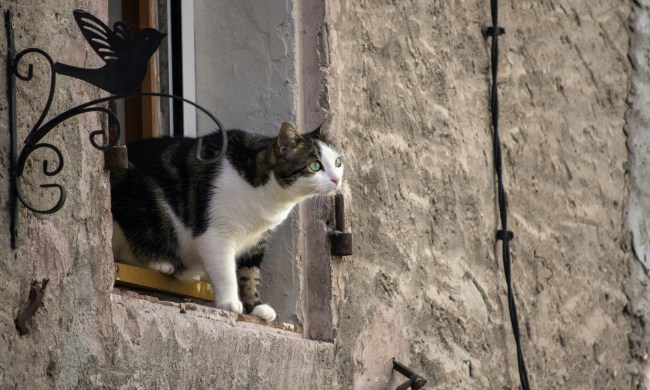Sometimes, you can remove items hazardous to your cat’s health from your home, such as daffodils. However, certain food products, like coffee and grapes, may be more challenging (or impossible) to nix from your lifestyle.
Bread is also often a kitchen table staple. The versatile carb is accessible and easy to dunk into soups, used for a sandwich, or topped with avocado. Your cat will likely be around bread throughout their lives. Is bread a threat to a cat’s life? Can cats eat bread? Some foods, like chocolate, can present severe health issues for cats. Others, like broccoli and carrots, are considered safe. Which list does bread fall into? The answer is complicated. Here’s what to know about whether bread is toxic for cats and if handing over a slice might improve their health.
Can cats eat bread?

Bread isn’t considered toxic for cats. If your sneaky kitty licks a crumb or small piece of bread off the floor, they’ll likely be OK.
However, you’ll want to steer clear of intentionally giving cats bread, especially in large quantities. Unlike humans, cats don’t need carbs to survive and thrive. As obligate carnivores, cats are required (obligated) to eat meat from animal flesh. Cat food is specially designed to provide this essential nutrient. The food also mixes in amino acids, vitamins, minerals, and energy. Your pet doesn’t need to eat anything else, including bread. Bread has empty calories for a cat. A slice of white bread has about one-fifth of the daily recommended calories for most cats.
After eating bread, your cat may want to wait to finish their food. However, they may still end the day having consumed excess calories. One day of overeating probably isn’t an issue (but may prompt a stomachache). However, chronically going over caloric limits could lead to obesity and health issues.
Are there benefits to giving cats bread?
Bread contains carbohydrates and fiber that are essential for humans. However, this food doesn’t provide any nutritional value for cats. However, pet parents may use bread to get a cat to take oral medications. In this case, bread could have an indirect health benefit. Limit bread intake to a small piece — enough to “hide” the pill — to protect your kitty from consuming too many calories.
Be warned: This “hack” won’t work for every cat. Some cats will outsmart you, and others might not like the taste of bread. (Cats are curious creatures, aren’t they?) Consider putting the medication in your cat’s regular food first — this suggestion might do the trick and prevent excess calorie consumption.
Is bread safe for cats?

Plain baked bread in small doses that don’t exceed daily calorie limits isn’t unsafe for cats. However, some breads could pose a greater health risk than empty calories, such as:
- Bread seasoned with toxic ingredients, like garlic and onions. (Avoid giving cats bread seasoned with anything, as you may not know if the ingredient is poisonous, and even nontoxic herbs and spices can cause stomachaches.)
- Bread used in a sandwich with toxic ingredients, such as tomatoes.
- Yeast in raw dough, which can produce alcohol and carbon dioxide to trigger health issues for a cat, including a distended stomach and significant bloating.
A distended stomach can become a serious medical emergency that needs immediate attention and — rarely — surgery.
Signs that your cat needs medical attention after consuming bread include:
- Diarrhea
- Vomiting
- Trouble breathing
Your pet’s vet, an emergency facility, or the Poison Control hotline (1-800-222-1222) can get your cat the help they need.
When in doubt, ask your pet’s vet before giving your cat food, including bread. A vet may recommend people avoid giving cats bread if they have specific health issues, such as diabetes or are overweight.
Closing thoughts

Some foods, like chocolate, are toxic for cats, but bread is not one of them. Cats can eat bread, but the general recommendation is to avoid feeding this food to your kitty, even as a treat. Felines are carnivores. Their food is the ideal protein, vitamins, and minerals blend. Bread is empty calories and can reduce the likelihood they’ll eat the food they need. Excess calorie consumption can lead to obesity and other health issues. Vets may put bread on the “no-fly list” for felines that have diabetes or need to lose weight.
Bread seasoned or topped with some ingredients like onions, garlic, and tomatoes can be toxic for cats. Look out for signs of distress, including vomiting and diarrhea. Call your vet if you have concerns about your cat’s health after eating bread. In fact, consult them before giving your pet bread, in the first place.




